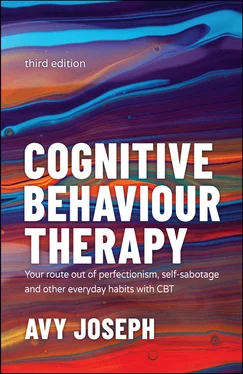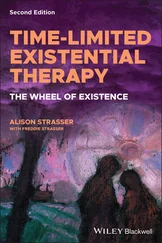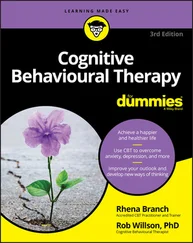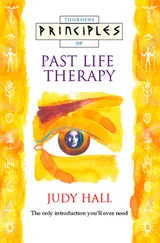Avy Joseph - Cognitive Behaviour Therapy
Здесь есть возможность читать онлайн «Avy Joseph - Cognitive Behaviour Therapy» — ознакомительный отрывок электронной книги совершенно бесплатно, а после прочтения отрывка купить полную версию. В некоторых случаях можно слушать аудио, скачать через торрент в формате fb2 и присутствует краткое содержание. Жанр: unrecognised, на английском языке. Описание произведения, (предисловие) а так же отзывы посетителей доступны на портале библиотеки ЛибКат.
- Название:Cognitive Behaviour Therapy
- Автор:
- Жанр:
- Год:неизвестен
- ISBN:нет данных
- Рейтинг книги:5 / 5. Голосов: 1
-
Избранное:Добавить в избранное
- Отзывы:
-
Ваша оценка:
- 100
- 1
- 2
- 3
- 4
- 5
Cognitive Behaviour Therapy: краткое содержание, описание и аннотация
Предлагаем к чтению аннотацию, описание, краткое содержание или предисловие (зависит от того, что написал сам автор книги «Cognitive Behaviour Therapy»). Если вы не нашли необходимую информацию о книге — напишите в комментариях, мы постараемся отыскать её.
Cognitive Behaviour Therapy
Cognitive Behaviour Therapy
Cognitive Behaviour Therapy — читать онлайн ознакомительный отрывок
Ниже представлен текст книги, разбитый по страницам. Система сохранения места последней прочитанной страницы, позволяет с удобством читать онлайн бесплатно книгу «Cognitive Behaviour Therapy», без необходимости каждый раз заново искать на чём Вы остановились. Поставьте закладку, и сможете в любой момент перейти на страницу, на которой закончили чтение.
Интервал:
Закладка:
| Unhealthy Negative Emotion | What the belief is about | Healthy Negative Emotion |
|---|---|---|
| Guilt | You have broken a moral code or the feelings of a significant person were hurt. | Remorse |
| How you think | How you think | |
| You have definitely committed a sin. | You think about what you did and put it in context before you make a judgement. | |
| You think you are more responsible than another. | You are balanced about your responsibility and the other person's. | |
| You forget about how things were. | You acknowledged the situation and the circumstances before you did what you did. | |
| You deserve punishment. | You don't think about retribution. | |
| What you do or what you feel like doing | What you do or what you feel like doing | |
| You escape from your feeling in destructive ways. | You face up to the healthy pain. | |
| You plead for forgiveness and/or punish yourself by physical deprivation. | You ask for forgiveness but you do not physically punish yourself. | |
| You make unrealistic promises never to do it again. | You make appropriate amends. | |
| You deny that you did anything bad. | You accept your poor behaviour without making excuses. |
SHAME VERSUS REGRET
| Unhealthy Negative Emotion | What the belief is about | Healthy Negative Emotion |
|---|---|---|
| Shame or Embarrassment | Something shameful has been revealed about you. Other people judge you or shun you. | Regret |
| How you think | How you think | |
| You exaggerate the shameful information revealed. | You remain compassionate about yourself. You accept yourself. | |
| You exaggerate the likelihood of negative judgement. | You are realistic about the likelihood of negative judgement. | |
| You think the negative judgement will last a long time. | You are realistic about the length of negative judgement. | |
| You exaggerate the degree of negative judgement. | You are realistic about the degree of negative judgement. | |
| What you do or what you feel like doing | What you do or what you feel like doing | |
| Avoid eye contact with others. | You continue participating in social events. | |
| Avoid others. | You accept others’ intervention to restore social harmony. | |
| Attack others who have shamed you. | ||
| Defend your ego in self‐defeating ways. Ignore others who attempt to help restore balance. |
UNHEALTHY ENVY VERSUS HEALTHY ENVY
| Unhealthy Negative Emotion | What the belief is about | Healthy Negative Emotion |
|---|---|---|
| Unhealthy envy | Another person has something you find desirable | Healthy envy |
| How you think | How you think | |
| You devalue the desired object. | You admit to yourself that you too desire it. | |
| You tell yourself that you don't want it, even if you do. | You admit that you'd also want it and accept that you do. | |
| You try to attain it, even if it is not useful to you. | You find ways to attain it only because you want it. | |
| You put other people down and attempt to deprive them of the desired object. What you do or what you feel like doing | You do not put other people down and you allow them to enjoy it. What you do or what you feel like doing | |
| You belittle the desired object verbally. | You do not belittle the desired possession. | |
| You belittle the other person verbally. | You attempt to attain it but only if you want it. | |
| You attempt to remove or deprive the other person from the desired possession. | ||
| You spoil or destroy the desired object or possession. | ||
UNHEALTHY JEALOUSY VERSUS HEALTHY JEALOUSY
| Unhealthy Negative Emotion | What the belief is about | Healthy Negative Emotion |
|---|---|---|
| Unhealthy jealousy | There is a potential threat to a relationship from another person | Healthy jealousy |
| How you think | How you think | |
| You see threat to your relationship when none exists. | You do not see threat where none exists. | |
| You think infidelity will definitely happen. | You do not think infidelity will definitely happen. | |
| You misinterpret your partner's conversation with and actions towards another as having sexual or romantic feelings. | You do not misinterpret your partner's conversation with another as having sexual meaning. | |
| What you do or feel like doing | What you do or feel like doing | |
| You have visual images of infidelity. | You do not create sexual images of your partner with another. | |
| If your partner admits to finding someone attractive, you see yourself as less attractive. | You accept that your partner can find another attractive without thinking that you are less attractive. | |
| You want your partner to only ever think of you. | You accept that your partner can see others as attractive just as you can. | |
You will notice the heading in both the unhealthy negative emotion and the healthy negative emotion ‘What you do or what you feel like doing’. The action that we take is called ‘behaviour’ and what we feel like doing is called ‘action tendency’. To understand and check whether your emotions are unhealthily or healthily negative it is more accurate to reflect on your action tendency. Ask yourself, ‘What did I feel like doing?’ If your answer is ‘I felt like running away’, then your emotion was anxiety. Sometimes, we behave differently to what we feel like doing and this can give the wrong assessment of emotions. For example, you agree to give a presentation at work but what you really feel like doing is avoiding and making up an excuse to get out of doing it. It's what you feel like when you are experiencing a negative emotion that gives you an accurate way of understanding your emotions. This is significant because many people behave in accordance with their action tendencies or in accordance with their unhealthy negative emotions such as anxiety. For example, you may feel like avoiding and then you act in accordance with that feeling and choose to avoid. Unfortunately, this would leave you emotionally stuck. Whether you act on the tendency is matter of choice. Just because you may have a tendency to act in a particular way does not mean that you have to. You can choose to act against what you feel like doing, that is, against your unhelpful action tendencies. In order to overcome emotional problems you need to think in a healthy way and act in accordance with the helpful action tendencies.
Читать дальшеИнтервал:
Закладка:
Похожие книги на «Cognitive Behaviour Therapy»
Представляем Вашему вниманию похожие книги на «Cognitive Behaviour Therapy» списком для выбора. Мы отобрали схожую по названию и смыслу литературу в надежде предоставить читателям больше вариантов отыскать новые, интересные, ещё непрочитанные произведения.
Обсуждение, отзывы о книге «Cognitive Behaviour Therapy» и просто собственные мнения читателей. Оставьте ваши комментарии, напишите, что Вы думаете о произведении, его смысле или главных героях. Укажите что конкретно понравилось, а что нет, и почему Вы так считаете.












